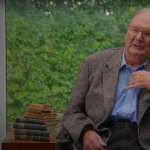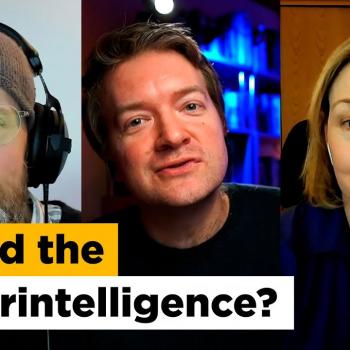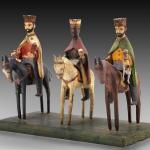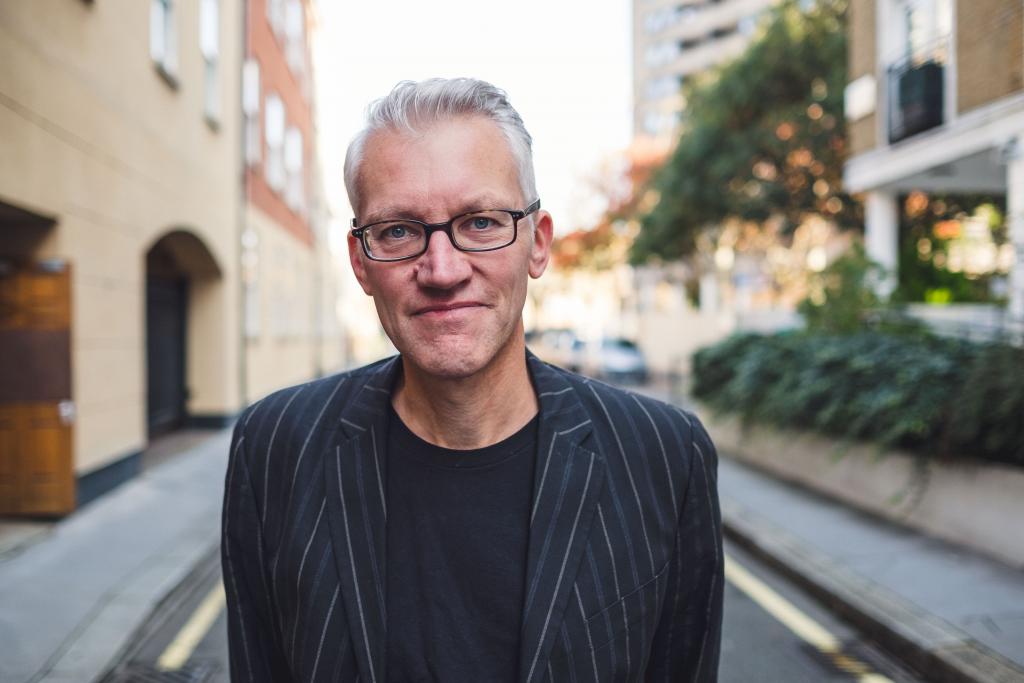
Why did a notable historian change his mind about Christianity? And what can we learn from it?
Historian Tom Holland created waves with an article he penned in 2016 in the New Statesman which suggested that we owe the underlying ethos of our Western Culture to Christianity and not ancient Rome or Greece. He concluded his article by stating, “In my morals and ethics, I have learned to accept that I am not Greek or Roman at all, but thoroughly and proudly Christian.”
He has since chronicled this academic journey in his fascinating book, Dominion: How the Christian Revolution Remade the World. Holland has unsurprisingly received push back over his assertion that Christianity shaped the modern world and such critique can be found on a thrilling episode of The Big Conversation from Unbelievable? where Tom goes toe-to-toe with atheist philosopher A.C. Grayling.
A year before that combative encounter, Holland sat down with New Testament scholar N.T. Wright on an episode of Unbelievable? for an altogether friendlier dialogue. They met to discuss his thesis especially as it related to the Apostle Paul. But their conversation included an enlightening account of Holland’s own intellectual and (dare I say?) spiritual journey.
Youthful Exuberance
Tom Holland was raised in the church but says that any Christian belief he had gradually fizzled out as the ‘dimmer switch’ of faith was turned down. He found that the underlying precepts of Christianity paled in comparison to the glamorous and exciting displays of power and domination he found in ancient Rome and Greece.
“I was the kind of child who loved dinosaurs. I liked them because they were big and they were fierce and they were glamorous, and they were extinct… It was a seamless movement from Tyrannosaurus Rex to Caesar. The glamour and the beauty and the power and the cruelty of the Greeks and the Romans I found very appealing…I went to Sunday school and was very interested in biblical history as well, but I found them all a bit po-faced, I didn’t like their beards, I preferred the clean-shaven look of Apollo. In a way I was kind of seduced by the glamour of Greece and Rome, so the first books I wrote about history were about Greece and Rome.”
His fascination with these ancient cultures prompted him to become a historian. Gradually, however, his awe was replaced by horror as he dug deeper and discovered the callous ways in which that power was actualized. Holland spent his youth marvelling at the marble statues of his Greek and Roman heroes but his academic studies soon revealed that they had feet of clay.
“The more you live in the minds of the Romans, and I think even more the Greeks, the more alien they come to seem, the more frightening they come to seem. And what becomes most frightening really is a kind of quality of callousness that I think is terrifying because it is completely taken for granted. There’s a kind of innocent quality about it, nobody really questions it…Caesar is by some accounts slaughtering a million Gaul’s and enslaving another million in the cause of boosting his political career and far from feeling in anyway embarrassed about this, he’s promoting it, and when he holds his triumph, people are going through the streets of Rome carrying billboards boasting about how many people he’s killed. This is a really terrifying alien world and the more you look at it, the more you realize that it is built on systematic exploitation… In almost every way, this is a world that is unspeakably cruel to our way of thinking and this worried me more and more.”
A Cultural Big Bang
Since Holland found the world he lived in to be so radically different from that of ancient Rome and Greece, he asked himself where those values came from? The West’s commitment to values of human dignity and equal rights didn’t spring from a vacuum. After extensive study, he concluded that they grew out of Christianity and that ‘most people are oblivious to the way in which the West’s Christian heritage has shaped modern education, healthcare, music, art, literature and the scientific revolution, to name but a few’.
Holland wasn’t suddenly bowled over by a blinding light of divine revelation but was gradually shaken out of his historical complacency by the skull–rattling after-shocks of a Golgothan earthquake. He was stunned to find that a small Jewish sect that worshiped a condemned criminal and who held to a relatively small corpus of sacred writings had radically changed the world.
“Compacted into this very, very small amount of writing was almost everything that explains the modern world and the way the West has then moved on to shape concepts like international law, concepts of human rights, all these kind of things. Ultimately, they don’t go back to Greek philosophers, they don’t go back to Roman imperialism. They go back to Paul. His letters, I think, along with the four gospels, are the most influential, the most impactful, the most revolutionary writings that have emerged from the ancient world.”
Holland sensed a background cultural radiation that he could only attribute to a Christian ‘Big Bang’, and as he looked back in time he found that it all began at a point where God and man were intensely concentrated in a Jesus singularity. He also discovered that not only was it responsible for a Big Bang but also a Cambrian-like explosion that radically transformed traditional institutions and gave them a distinct Christian morphology.
“Well, if we’re talking of Paul, I think of him as a kind of depth charge, deep beneath the foundations of the classical world. It’s not anything that you particularly notice if you’re in Corinth or Alexandria and then you start feeling this kind of rippling outwards and by the time you get to the 11th century, in Latin Christendom, everything has changed. Paul’s significance is that he sets up ripple effects of revolution throughout Western history.”
Whether it was a road-to-Damascus moment, or simply the dawning of a deep appreciation of the story that has shaped him and the Western mind, Holland says, “I began to realise that actually, in almost every way I am Christian.”
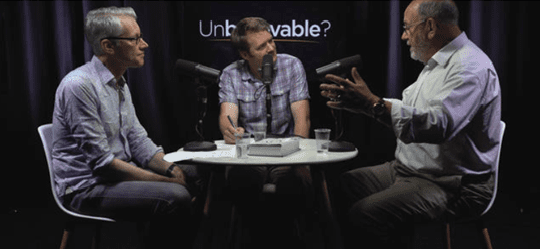
Image Attribution: Premier Christian Radio
My Kingdom is not of this World
There is an episode in the Gospels that exemplifies Tom Holland’s discovery of the way Christianity challenged the cultural status quo. The pivotal moment in world history was when Jesus went toe-to-toe with Pilate. It was the ultimate showdown between the power of man and the power of God and the world would never be the same.
So Pilate entered his headquarters again and called Jesus and said to him, “Are you the King of the Jews?” Jesus answered, “Do you say this of your own accord, or did others say it to you about me?” Pilate answered, “Am I a Jew? Your own nation and the chief priests have delivered you over to me. What have you done?” Jesus answered, “My kingdom is not of this world. If my kingdom were of this world, my servants would have been fighting, that I might not be delivered over to the Jews. But my kingdom is not from the world.”
Pilate asked Jesus if He was a king who should be feared. Jesus then drew the distinction between His Kingdom and Pilate’s by explaining that if His Kingdom played by the rules of the world, He would have kicked Pilate’s butt long ago. Pilate is incredulous because he sees standing before him a flogged criminal claiming to be a king. The heavy boot of Roman power is about to crush Him and yet Jesus tells Pilate that his authority is an illusion.
So Pilate said to him, “You will not speak to me? Do you not know that I have authority to release you and authority to crucify you?” Jesus answered him, “You would have no authority over me at all unless it had been given you from above.”(John 19:10-11)
Ironically, Pilate then releases the full force of Rome on Jesus only to unleash the full power of God’s Kingdom. Jesus’ greatest power play turns out to be a passion play. It is on the cross where the world’s power meets God’s weakness, the world’s wisdom meets God’s foolishness, and despite the apparent Roman victory the stumbling block becomes the foundation.
For consider your calling, brothers: not many of you were wise according to worldly standards, not many were powerful, not many were of noble birth. But God chose what is foolish in the world to shame the wise; God chose what is weak in the world to shame the strong.” (1 Corinthians 1:26-27)
A Different Kind of Kingdom
The reason that Christianity has so dramatically affected the world is because Jesus’ death and resurrection inaugurated a Kingdom that Pilate found unbelievable. A Kingdom powered by a sacrificial love that gets more powerful every time it surrenders. Pilate thought he had put an end to this movement because the Roman playbook suggested that the best strategy was to kill the opposition’s King, but what Rome discovered was that every time they cut the Body of Christ the blood just spread more Gospel seeds.
But how do Gospel seeds take root in the hard-Roman soil? Jesus made it clear that His Kingdom was irrigated with a completely different water. It wasn’t like the water from the harsh reign of Caesar but was a Living Water that bubbled up from the tomb of a crucified messiah. A Kingdom not influenced by special interest but rather by those of little interest. A Kingdom not funded by the rich but by the poor in spirit. A Kingdom not administered by the movers and shakers but rather the shook.
“Blessed are the poor in spirit, for theirs is the kingdom of heaven.
“Blessed are those who mourn, for they shall be comforted.
“Blessed are the meek, for they shall inherit the earth.
“Blessed are those who hunger and thirst for righteousness, for they shall be satisfied.
“Blessed are the merciful, for they shall receive mercy.
“Blessed are the pure in heart, for they shall see God.
“Blessed are the peacemakers, for they shall be called sons of God.
“Blessed are those who are persecuted for righteousness’ sake, for theirs is the kingdom of heaven. (Matthew 5: 3-10)
Jesus turns the ruling structure of the world on its head, not by divine fiat, but by divine precedent.
But Jesus called them to him and said, “You know that the rulers of the Gentiles lord it over them, and their great ones exercise authority over them. It shall not be so among you. But whoever would be great among you must be your servant, and whoever would be first among you must be your slave, even as the Son of Man came not to be served but to serve, and to give his life as a ransom for many.” (Matthew 20: 25-28)
It is a Kingdom that just won’t go away despite the many predictions of its ultimate demise by atheists throughout history. They continue to be irked that a band of weak misfits has survived thousands of years of religious natural selection and are oblivious to the historical reality that they are actually the evolutionary dead ends.
Power Made Perfect in Weakness
The power found in weakness manifest in Jesus’ death and resurrection was the focus of Paul’s ministry.
But he said to me, “My grace is sufficient for you, for my power is made perfect in weakness.” Therefore I will boast all the more gladly of my weaknesses, so that the power of Christ may rest upon me. For the sake of Christ, then, I am content with weaknesses, insults, hardships, persecutions, and calamities. For when I am weak, then I am strong. (2 Corinthians 12: 9-10)
N.T. Wright, Holland’s conversation partner, recognized the cosmic significance of the Jesus event and wrote an outstanding book, the title of which encapsulates the radical nature of God’s Kingdom: The Day the Revolution Began: Reconsidering the meaning of Jesus’s Crucifixion. Wright not only highlights what made the Jesus movement so revolutionary but also places Paul at the forefront of its spread.
Paul sees himself standing at the cutting edge of the revolution. The death of Jesus has opened up a whole new world, and he is part of the team leading the way into unexplored territory. He is not only to announce, but also to embody the faithfulness of the creator God to his covenant and his world.
Unequally Yoked
Christianity initially grew because of the suffering service of its adherents. It had no political power for several centuries yet it continued to gain followers. However, once it hitched its wagon to the Constantine cart it went off the rails because power found in weakness doesn’t gel well with a government that wants to flex its muscle.
We need to be very careful when we try to use worldly power to promote a Gospel that is inherently about power in weakness. When we take Christianity into the halls of power we are in essence asking Jesus to leave His embarrassing life of suffering service behind and become the poster boy for a political cause. God has always worked through that which the world considered foolishness, yet we seem intent on making Him worldly wise. We need to take Paul’s exhortation in the second chapter of Philippians seriously because it constitutes the rule of law for the Kingdom of God.
Have this mind among yourselves, which is yours in Christ Jesus, who, though he was in the form of God, did not count equality with God a thing to be grasped, but made himself nothing, taking the form of a servant, being born in the likeness of men. And being found in human form, he humbled himself by becoming obedient to the point of death, even death on a cross. (Philippians 2: 5-8)
More Yielding and Less Wielding
Tom Holland’s witness is powerful because as a historian he understands how cultures rise and fall and is acutely aware of the terrible consequences of power inappropriately applied. Sadly, we often promote Christianity as a way to do culture better rather than as a way to be countercultural. The Gospel isn’t about mastering the power of this world but about bringing Godly power to bear on earth as it is in heaven.
Since we live in that difficult time between the already and the not yet of God’s Kingdom we cannot just remove ourselves from the world. We must still render unto Caesar what is Caesar’s and be subject to the authorities, but we cannot forget that we are also citizens of another Kingdom where we render unto God what is God’s and obey God rather than men. We have been saved by a God who did not wield a hammer but yielded to the nails. Maybe we can let more of God’s Kingdom peek through if we practice a bit more yielding and a bit less wielding.
Watch or listen to Tom Holland and NT Wright on Unbelievable?


